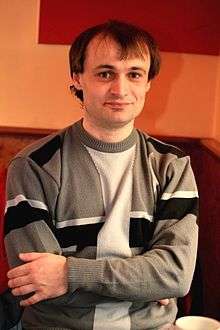Luboš Motl
Luboš Motl (Czech pronunciation: [ˈluboʃ ˈmotl̩]; born December 5, 1973) is a Czech theoretical physicist. He was an assistant professor at Harvard University from 2004 to 2007. His scientific publications were focused on string theory.
Luboš Motl | |
|---|---|
 Luboš Motl in 2011 | |
| Born | 5 December 1973 |
| Alma mater | Charles University (MA) Rutgers University (PhD) |
| Known for |
|
| Scientific career | |
| Fields | Theoretical physics, String theory |
| Thesis | Nonperturbative Formulations of Superstring Theory (2001) |
| Doctoral advisor | Tom Banks |
Life and career
Motl was born in Plzeň, present-day Czech Republic. He won a Bronze Medal at the 1992 International Mathematical Olympiad.[1] He received his master's degree from the Charles University in Prague, and his Doctor of Philosophy degree from Rutgers University (2001) and has been a Harvard Junior Fellow (2001–2004) and assistant professor (2004–2007) at Harvard University. In 2007, he left Harvard and returned to the Czech Republic.
Although an undergraduate at a Czech university where none of the faculty specialized in string theory, Motl came to the attention of string theorist Thomas Banks in 1996, when Banks read an arXiv posting by Motl on matrix string theory. "I was at first a little annoyed by [Motl's] paper, because it scooped me," said Banks. "This feeling turned to awe when I realized that Lubos was still an undergraduate".[2] He then became a graduate student of Banks, and wrote his PhD thesis on matrix theory. While at Harvard, Motl worked on the pp-wave limit of AdS/CFT correspondence, twistor theory and its application to gauge theory with supersymmetry, black hole thermodynamics and the conjectured relevance of quasinormal modes for loop quantum gravity, deconstruction, and other topics. In 2006, he proposed the Weak Gravity Conjecture with Nima Arkani-Hamed, Alberto Nicolis and Cumrun Vafa. He is the author of L'équation Bogdanov, a 2008 French-language book discussing the scientific ideas and controversy of the Bogdanov brothers.[3]
The Reference Frame
Motl writes a science and politics blog called "The Reference Frame: Supersymmetric world from a conservative viewpoint", which has been described as an "over-the-top" defense of string theory.[4] Following the example of Oriana Fallaci, he characterizes himself as a Christian atheist.[5][6] Motl also describes himself as a "champion of the Consistent Histories interpretation of quantum mechanics",[7] and has strongly criticised Erik Verlinde's entropic gravity theory.[8][9]
References
- "International Mathematical Olympiad". International Mathematical Olympiad. Retrieved 2017-10-11.
- "The World of Science Becomes a Global Village; Archive Opens a New Realm of Research", James Glanz, New York Times, May 1, 2001
- Motl, Luboš (2008). L'équation Bogdanov: le secret de l'origine de l'univers?. Presses de la Renaissance. ISBN 978-2750903862.
- Musser, George (2008). The Complete Idiot's Guide to String Theory - George Musser. p. 279. ISBN 9781592577026. Retrieved 2015-08-25.
- "Are all climate skeptics theocratic?". The Reference Frame. 2011-09-09. Retrieved 2015-08-25.
- "The Reference Frame: Oriana Fallaci: The Force of Reason". Motls.blogspot.com. 2006-09-27. Retrieved 2015-08-25.
- "Copenhagen interpretation of quantum mechanics". The Reference Frame. 2011-05-29. Retrieved 2019-06-17.
- "First test of rival to Einstein's gravity kills off dark matter". New Scientist. 2016-12-15. Retrieved 2017-08-01.
- "Verlinde's de Sitter MOND is highly incomplete, to say the least". The Reference Frame (Blog). 2016-11-12. Retrieved 2017-08-01.
External links
| Wikiquote has quotations related to: Luboš Motl |
- The Reference Frame, Luboš Motl's blog